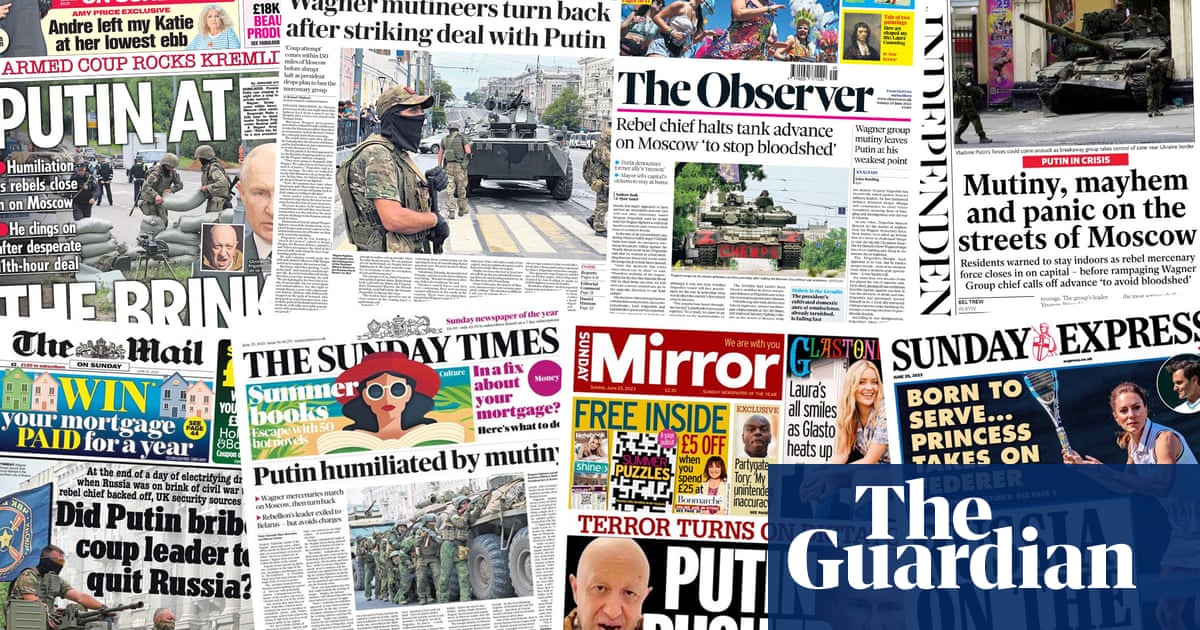
The extraordinary uprising by the Wagner mercenary force so crucial to Vladimir Putin’s war machine in Ukraine has dominated headlines around the world and raised question marks about the Russian president’s grip on power.
The Sunday Times said “Putin humiliated by mutiny” alongside a main picture showing Wagner mercenaries training their rifles on the Russian military headquarters in Rostov-on-Don, the southern Russian city key to the invasion of Ukraine.
The Observer says “Rebel chief halts tank advance on Moscow ‘to stop bloodshed’” next to an image of a Wagner tank in Rostov-on-Don. Analysis by Luke Harding also features on the front, in which he says the mutiny led by Wagner chief Yevgeny Prigozhin leaves Putin at his weakest in decades.
Bild in Germany has the headline: “Uprising against Putin” next to images of Wagner fighters. Its subhead reads: “The putsch attempt in Russia and what that means for us.” Die Welt and Der Spiegel both speak of a “power struggle” in Russia on their front pages.
The New York Times carried analysis on what the short-lived mutiny said about Putin’s hold on power. Correspondent Peter Baker noted the dangers and the opportunity the volatility presented to the US; the danger being an under-threat president in charge of nuclear missiles, and the opportunity a weakening of Russia’s war effort, to Ukraine’s gain.
The Washington Post cast the past 24 hours as the gravest threat to Putin’s presidency “that till now has thrived on Putin’s ability to divide and rule by pitting rival groups against each other and serving as the ultimate arbiter among feuding elites”. It added: “After more than two decades of autocratic rule, Putin’s hubris has repeatedly clouded his judgment — both in invading Ukraine and in misjudging whether Prigozhin could pose a threat.”
The Wall Street Journal said the Ukraine war had “backfired on Putin” in its main digital headline. It noted the west’s stance, which might best by described as “stand well back” and avoid any suggestion of taking sides. It referred to a State Department memo sent to its overseas missions: “The United States has no intention of involving itself in this matter.”
The Sunday Mirror has “Putin pushed to brink” on its front page, alongside pictures of the two main figures; the Russian president and Prigozhin. Its strapline above it reads: “Terror turns on dictator.”
The Sunday Express goes slightly wider with “Russia on the brink” in its headline, noting the potential for a civil war. The Sun on Sunday also follows that theme with “Putin at the brink.”
The Sunday Telegraph says “Wagner mutineers turn back after striking deal with Putin” and notes the rebel convoy heading to Moscow came within 150 miles (240km) before coming to an “abrupt halt”. It carries analysis from historian Professor Robert Tombs on its front, in which he says Putin “narrowly avoided his 1917 moment”, a reference to the Russian revolution. He then says: “For a state to exist at all, the men with guns have to be willing to obey it. After the fiasco of the past few hours and months, how long will this apply to Putin?”
The Mail on Sunday speculates as to why the rebellion was so shortlived. The headline asks: “Did Putin bribe coup leader to quit Russia?” and quotes anonymous UK security sources to support the suggestion that Putin offered Prigozhin millions of pounds to call off his uprising.
The Independent looks at the effect of the rebellion in Moscow, where “anti-terror” measures were taken, roadblocks set up and residents warned to stay indoors as the Wagner convoy approached. Its headline reads “Mutiny, mayhem and panic on the streets of Moscow”.
"about" - Google News
June 25, 2023 at 10:42AM
https://ift.tt/cMd5B9x
‘Putin humiliated’: what the papers said about the Wagner rebellion in Russia - The Guardian
"about" - Google News
https://ift.tt/XtcGyL4
Bagikan Berita Ini














0 Response to "Putin humiliated: what the papers said about the Wagner rebellion in Russia - The Guardian"
Post a Comment